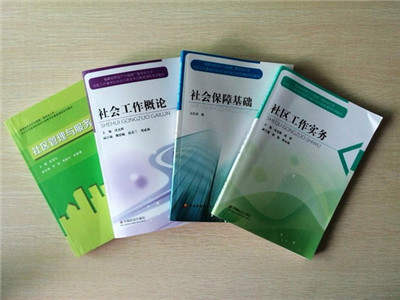 Recently, the on-the-job training programme for community workers in Fujian Province, undertaken by Fujian RTVU, has achieved success through all phases of development and implementation. With the publication of two textbooks entitled “Community Work Practice” and “An Introduction to Social Work” on the 15th of March, Fujian RTVU has completely finished all the work of platform setup, construction of curriculum textbooks, and the production of video courses for the on-the-job training and degree education for community workers in the whole province.
Recently, the on-the-job training programme for community workers in Fujian Province, undertaken by Fujian RTVU, has achieved success through all phases of development and implementation. With the publication of two textbooks entitled “Community Work Practice” and “An Introduction to Social Work” on the 15th of March, Fujian RTVU has completely finished all the work of platform setup, construction of curriculum textbooks, and the production of video courses for the on-the-job training and degree education for community workers in the whole province.
The first phase encompassed the publication of a textbook series about on-the-job training for community workers. In order to promote a professional and specialized standard of community workers and advance the healthy development of community work, Fujian Provincial Department of Civil Affairs and Fujian RTVU worked together to compile the textbook series entitled “Courses for On-The-Job Training for Community Workers and Higher Degree Education”, including “Foundation of Social Security”, “ Community Service and Management”, “Community Work Practices”, and “An Introduction to Social Work”, with a word counting totaling 1.1 million and video based teaching materials of 900 minutes. The provincial Party committee and the provincial government placed great emphasis on the series of books. Vice Governor Chen Rongkai personally penned the preface to the book series.
The second phase was to open the “On-line training for community workers in Fujian” platform. This learning platform is able to take full advantage of Fujian RTVU's superior experience in distance education. It set up such modules as: specialists' video lecture, online assignment test, teaching management documents, and scores searches. Smooth network, classic case analysis, teaching direction by famous teachers, abundant content, and easy VOD come together to provide a convenient learning experience for the students.
The last phase is to measure the effect that initial successes have had on the training. The first batch of 4,627 students began training in the autumn of 2013, among them more than 1,100 people participated in RTVU's study of the open education. Preparations for the enrollment of the second batch of students has already begun. After only a half-year of training, the students repeatedly expressed that although the training time was short, the content was abundant and very practical, and as a result, they would place more emphasis on study, and promote quality and vocational skills from now on.
It was reported that the Organization Department of the Fujian Provincial Committee, Fujian Provincial Department of Civil Affairs, and Fujian RTVU jointly launched the on-the-job training and degree education for community workers in September of 2013, and took the lead in fully implementing the deployment requirements related to reinforcing the educational training for community workers set by the Central Committee of the CPC. The training would provide broad education to all members of community party organizations and residents' committee within three years, and to other community workers at least once every two years. Until the end of the “12th Five-Year Plan”, it is expected that among all community workers, the percentage of those with an undergraduate degree or above was not lower than 15%, college degree or above not lower than 60%, and technical secondary school degree or above not lower than 90%. The on-the-job training is divided into a first semester and a second semester every year, with two courses opened for each semester. There were four credits separately for each course, and sixteen credits total. Face-to-face tutorial, self-directed learning, and distance teaching were integrated and carried out through online education. Students who participated in studying four regulated courses and passed the exams could obtain a post qualification certificate and a graduation diploma of degree education courses, which is also one of the main standards for employing community workers by community workstations. On the basis of participation in on-the-job training, students who met the entrance requirements could take part in the degree education ranging from technical secondary school education to college diploma to undergraduate degree, and the credits obtained from the four courses in on-the-job training could substitute for credits of equivalent courses. Students who met the requirements for graduation could obtain an academic certificate which will be recognized by the state.


By Yan Yunyan, Fujian RTVU